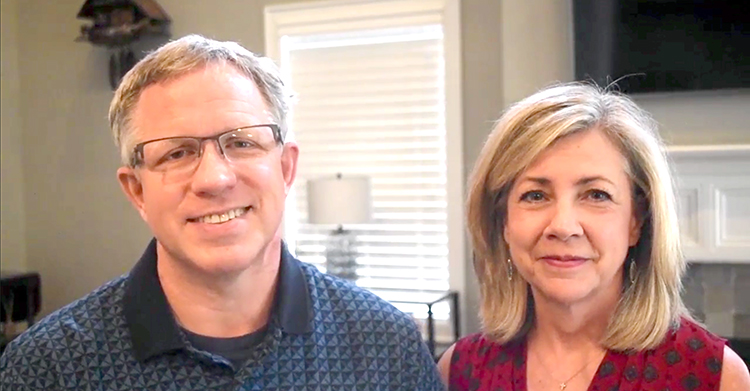
Rev-Dr_Thomas and Joy Boone.jpg
By Dave Yochum. He may not have met the late Rev. Didi Wayland, long-time pastor of Bethel Presbyterian Church and a spiritual leader in Lake Norman for 50 years, but the incoming pastor, Thomas Boone, is a regular guy, highly educated, has a sense of humor and looks like he will follow in Wayland’s gregarious but theologically based footsteps.
He’s also a descendant of Daniel Boone, the pioneer and explorer. Rev. Dr. Thomas Boone, who likes to be called Tom, will preach his first sermon at Bethel Sept. 17. Bethel has called only four senior pastors over the past 65 years.
Boone was selected based on his conservative theology, heart for mission work, engaging sermons and humble personality, all packaged up in a highly educated, experienced and well-traveled package.
Didi Wayland, of course, was born in China. (Didi means younger or little brother in Mandarin Chinese.) Boone was born in Texas where his father was a tax lawyer in the oil industry. The family—he is the oldest of three—moved a lot, so by the time he was 18 he had lived in several states and three countries, including Indonesia. He is the first minister in the family. You might say education—and his calling—came organically.
“When I was 19 I was at a missions conference for university students. I was studying to be a lawyer like my father. But, at that conference, I helped someone with a pretty big family issue by exploring scripture and praying until 2 a.m. I walked away from that experience knowing that’s what I was supposed to do with my life. Hearing Billy Graham earlier that night didn’t hurt either,” Boone says.
He has a B.A. in English Literature from Calvin College and Masters degrees in Divinity (Regent College in British Columbia) and Theology (Princeton Theological Seminary). His Ph.D. in theology is from Loyola University in Chicago.
In addition to pastoring Presbyterian churches in Alabama, Florida, Georgia, New Jersey and South Carolina, he chaired the Department of Theology at LCC International University in Lithuania, where he developed and maintained ecclesial relationships between LCC and churches in Lithuania, Latvia and Ukraine.
Cornelius will be a change, but the frontier/explorer gene in Boone is ready. Unbeknownst to most congregants, the Boones attended a service at Bethel and were taken by the openness and friendliness of the congregation. They came away smitten.
“Joy and I felt at home from the moment we stepped into Bethel. The team of people who interviewed me were terrific and we all just clicked from the start. Joy came away from Cornelius and you’d think she was on the Chamber of Commerce. The lake sealed the deal,” Boone said.
Religion is important in Cornelius—there are more than a dozen churches in 28031—the Bible Belt and the nation, even though how we practice is changing.
Bethel Presbyterian is part of the ECO Presbyterian churches, a movement within Presbyterianism as much as a denomination.
It dates back to 2010, when seven pastors were concerned by the declining membership within their denomination—from 4 million to 2 million in 40 years. They worried that growing denominational disputes over theology and bureaucracy took the focus off their pastoral calling. In 2011, they wrote to fellow pastors around the country, asking they would want to join in. There was a massive gathering in Minneapolis, and by 2012, a new denomination was formed. It’s properly called ECO: A Covenant Order of Evangelical Presbyterians.
Theologically, the split from PCUSA boils down to two points, Boone said. “PCUSA changed language regarding the lordship of Jesus Christ that created ambiguity around this key theological principal. Second, PCUSA changed language regarding authority of scripture from ‘authority’ and ‘obedience’ to it being a ‘guide.’ The ECO realigned with traditional Reformed teaching on this point,” he said.
Just like Rotary, Kiwanis and even traditional newspapers, old-line mainstream churches are facing big-time challenges.
“There’s so much that seems to be in flux,” Boone said. “I’m in the school of thought that what we’re seeing is a combination of post-secularity—people saying they don’t need organized religion to connect to God—and not adapting to meet the needs of millennials [which are] cause-driven, short-term commitment expectations, minimal financial impact. Add to this that we live in a fluid environment where mobility is normative.”
Boone is the man to negotiate the new frontier of 21st century America. He says adaptation will be important.
“We don’t have to look beyond Blockbuster and Kodak to see what happens when organizations don’t adapt,” he said. “Speaking of the church, the ECO movement…has adapted by decentralizing leadership, becoming less clergy-centered, defining growth more as partners engaging in their communities for Christ less than ‘coming to church,’ and some other ways while being clear about our DNA. The impact ECO churches are making for Christ across the U.S. and in the world is energizing.”




